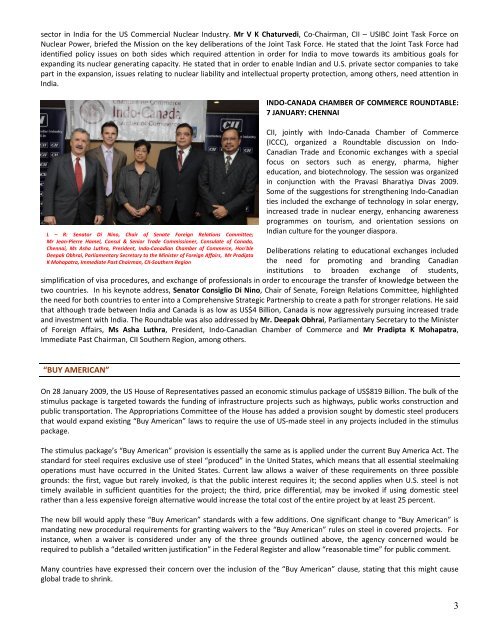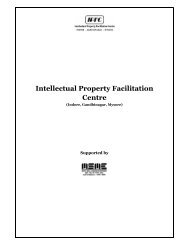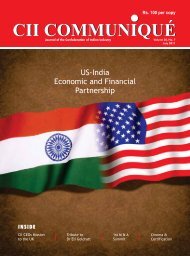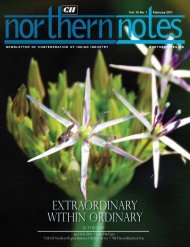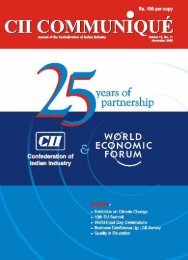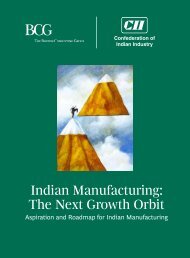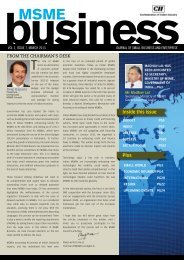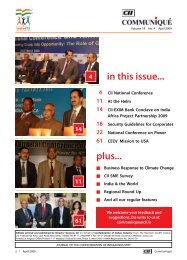US Monthly Report - January, 2009 - CII
US Monthly Report - January, 2009 - CII
US Monthly Report - January, 2009 - CII
You also want an ePaper? Increase the reach of your titles
YUMPU automatically turns print PDFs into web optimized ePapers that Google loves.
sector in India for the <strong>US</strong> Commercial Nuclear Industry. Mr V K Chaturvedi, Co‐Chairman, <strong>CII</strong> – <strong>US</strong>IBC Joint Task Force onNuclear Power, briefed the Mission on the key deliberations of the Joint Task Force. He stated that the Joint Task Force hadidentified policy issues on both sides which required attention in order for India to move towards its ambitious goals forexpanding its nuclear generating capacity. He stated that in order to enable Indian and U.S. private sector companies to takepart in the expansion, issues relating to nuclear liability and intellectual property protection, among others, need attention inIndia.L – R: Senator Di Nino, Chair of Senate Foreign Relations Committee;Mr Jean‐Pierre Hamel, Consul & Senior Trade Commissioner, Consulate of Canada,Chennai, Ms Asha Luthra, President, Indo‐Canadian Chamber of Commerce, Hon'bleDeepak Obhrai, Parliamentary Secretary to the Minister of Foreign Affairs, Mr PradiptaK Mohapatra, Immediate Past Chairman, <strong>CII</strong>‐Southern RegionINDO‐CANADA CHAMBER OF COMMERCE ROUNDTABLE:7 JANUARY: CHENNAI<strong>CII</strong>, jointly with Indo‐Canada Chamber of Commerce(ICCC), organized a Roundtable discussion on Indo‐Canadian Trade and Economic exchanges with a specialfocus on sectors such as energy, pharma, highereducation, and biotechnology. The session was organizedin conjunction with the Pravasi Bharatiya Divas <strong>2009</strong>.Some of the suggestions for strengthening Indo‐Canadianties included the exchange of technology in solar energy,increased trade in nuclear energy, enhancing awarenessprogrammes on tourism, and orientation sessions onIndian culture for the younger diaspora.Deliberations relating to educational exchanges includedthe need for promoting and branding Canadianinstitutions to broaden exchange of students,simplification of visa procedures, and exchange of professionals in order to encourage the transfer of knowledge between thetwo countries. In his keynote address, Senator Consiglio Di Nino, Chair of Senate, Foreign Relations Committee, highlightedthe need for both countries to enter into a Comprehensive Strategic Partnership to create a path for stronger relations. He saidthat although trade between India and Canada is as low as <strong>US</strong>$4 Billion, Canada is now aggressively pursuing increased tradeand investment with India. The Roundtable was also addressed by Mr. Deepak Obhrai, Parliamentary Secretary to the Ministerof Foreign Affairs, Ms Asha Luthra, President, Indo‐Canadian Chamber of Commerce and Mr Pradipta K Mohapatra,Immediate Past Chairman, <strong>CII</strong> Southern Region, among others.“BUY AMERICAN”On 28 <strong>January</strong> <strong>2009</strong>, the <strong>US</strong> House of Representatives passed an economic stimulus package of <strong>US</strong>$819 Billion. The bulk of thestimulus package is targeted towards the funding of infrastructure projects such as highways, public works construction andpublic transportation. The Appropriations Committee of the House has added a provision sought by domestic steel producersthat would expand existing “Buy American” laws to require the use of <strong>US</strong>‐made steel in any projects included in the stimuluspackage.The stimulus package’s “Buy American” provision is essentially the same as is applied under the current Buy America Act. Thestandard for steel requires exclusive use of steel “produced” in the United States, which means that all essential steelmakingoperations must have occurred in the United States. Current law allows a waiver of these requirements on three possiblegrounds: the first, vague but rarely invoked, is that the public interest requires it; the second applies when U.S. steel is nottimely available in sufficient quantities for the project; the third, price differential, may be invoked if using domestic steelrather than a less expensive foreign alternative would increase the total cost of the entire project by at least 25 percent.The new bill would apply these “Buy American” standards with a few additions. One significant change to “Buy American” ismandating new procedural requirements for granting waivers to the “Buy American” rules on steel in covered projects. Forinstance, when a waiver is considered under any of the three grounds outlined above, the agency concerned would berequired to publish a “detailed written justification” in the Federal Register and allow “reasonable time” for public comment.Many countries have expressed their concern over the inclusion of the “Buy American” clause, stating that this might causeglobal trade to shrink.3


